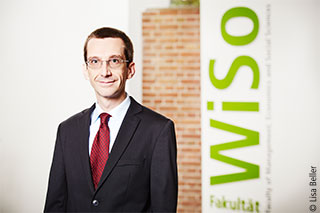For the first time an economist has succeeded in attracting a "Reinhart Koselleck-Project". Professor Dr. Patrick W. Schmitz from the WiSo Faculty of the University of Cologne can be pleased about the funding commitment of the German Research Foundation (DFG). The DFG will support his project "Incomplete Contracts and the Design of Institutions" with 915,000 euros. The project is concerned with basic research in the field of contract theory, a subfield of microeconomics.
The theory of incomplete contracts is one of the most important advances in microeconomic research in the last three decades. In traditional economic models, decision makers can agree on comprehensive contracts that specify every aspect of their relationship. In reality, it is not possible to write such detailed contracts. If in the future a contingency realizes that was not taken care of in the contract, the question arises who has the right to make decisions. Hence, the theory of incomplete contracts allows us to formulate concepts such as power and control precisely. This is an indispensable prerequisite for the formal analysis of institutions.
However, the theory of incomplete contracts has been subject to fundamental criticism for some years now. The aim of Professor Schmitz's project is to return to the almost forgotten origins of the theory in order to bring about a much-needed change in perspective. To this end, basic research is to be carried out using game-theoretic methods. Important insights can be expected in fields such as political economy, environmental economics, and public procurement. For instance, research on incomplete contracts can help to find innovative answers to current questions such as „How should referenda be designed against the background of the Brexit vote, for example?“ „How should control rights be assigned in order to facilitate agreements on the reduction of harmful emissions?“ or „How should institutions be designed to increase cost efficiency in view of the delays and cost increases in cases such as the Capital Airport BER?“
Since 2008, the DFG has provided funding for "Reinhart Koselleck-Projects" for scientists who have distinguished themselves through outstanding scientific achievements. This is intended to give them the freedom to concentrate on particularly innovative and risky research for five years. To date, 103 Koselleck projects have been funded. Professor Schmitz is the first economist in Germany to be granted a Koselleck project. Third-party funding amounts to 915,000 euros (including programme allowance).
The international economic database IDEAS ranks Professor Schmitz, who obtained his doctoral degree at the University of Bonn, among the world's leading researchers in the field of contract theory and applications. Professor Schmitz is the second scientist to succeed in bringing a Koselleck project to Cologne. The first Koselleck project in Cologne was awarded five years ago to the biologist Professor Dr. Thomas Langer (Director at the Max Planck Institute for Biology of Ageing).
